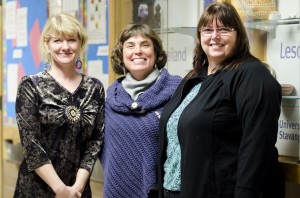Photo by Ashley Wadhwani/The Omega
KAMLOOPS, B.C. (CUP) — Researchers at Thompson Rivers University are conducting a pilot study looking at healthcare accessibility and use by female international students.
The researchers, senior lecturer Florriann Fehr and co-investigators Kim Munich and Wendy McKenzie, are collecting data through interviews with women on their experiences with Canada’s healthcare system.
The interviews are focusing on the “specific cultural and religious influences (that) may influence unaddressed healthcare needs while attending Canadian post-secondary programs,” according to the study’s description.
According to Fehr, the data is already showing insufficiencies in Canadian healthcare, particularly maternity care.
For example, international students, specifically women from Saudi Arabia, are having babies in Kamloops, but where these women are getting post-pregnancy care is unclear.
The data is already revealing a misunderstanding on the insurance coverage that international students have, where some female students believe it’s cheaper to travel back to their home countries in order to have basic procedures, according to Fehr.
Click here for the original article in the Omega
The data has also shown a disconnect between Western uses of medications and other cultural beliefs or practices. According to Fehr, some Chinese students bring an extra bag of luggage filled with traditional medicines from home such as teas and herbs.
“They don’t have any trust with the Westernized system. There is no bridging between the kinds of (medications) we have offered here and their stuff,” Fehr said. “When they go and see a doctor, they’re worried that they’re going to be given medicine that isn’t safe.”
Other cultural differences found in the data include the concept of 911. In Mainland China they have several emergency numbers for specific emergencies, according to Fehr. “Some have phoned 911 not knowing what to expect on the other side and have panicked,” she said.
Other misconceptions include the role a pharmacist plays in prescriptions, how breastfeeding clinics work, and a struggle adjusting to Canadian food that can lead to skin and stomach issues.
The group has mostly interviewed female students from China and India, but the pilot study is looking to expand to all groups on campus.
“At this point we’re just collecting data,” said Fehr. “We need more answers and we definitely need other cultures.”
Fehr completed her PhD with a focus on students raising children while they’re in post-secondary programs.
“My whole interest is making sure that this transition, of coming here on campus and having their academic life, is balanced with all the other stuff they need to have done outside of school,” she said. “There’s this vulnerable group or unknown group of TRU international students, females in particular.”





